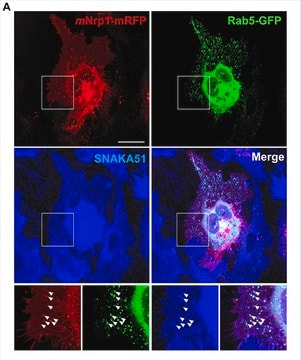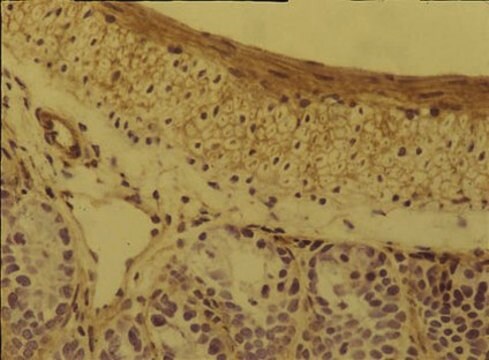MAB1956Z
Anti-Integrin αVβ1 Antibody
CHEMICON®, mouse monoclonal, P1D6
Synonyme(s) :
CD49e, MAB1956
About This Item
Produits recommandés
Nom du produit
Anti-Integrin α5 Antibody, clone P1D6, azide free, clone P1D6, Chemicon®, from mouse
Source biologique
mouse
Niveau de qualité
Forme d'anticorps
purified antibody
Type de produit anticorps
primary antibodies
Clone
P1D6, monoclonal
Espèces réactives
human
Fabricant/nom de marque
Chemicon®
Technique(s)
immunohistochemistry: suitable
Isotype
IgG3
Numéro d'accès NCBI
Numéro d'accès UniProt
Conditions d'expédition
wet ice
Modification post-traductionnelle de la cible
unmodified
Informations sur le gène
human ... ITGA5(3678)
Description générale
Spécificité
Application
MAB1956Z is not reactive with the denatured alpha 5 subunit. For immunoblotting, a dot blot is suggested as an alternative to western blotting.
Cell Structure
Integrins
Forme physique
Stockage et stabilité
Remarque sur l'analyse
Widely expressed, ovary
Autres remarques
Informations légales
Clause de non-responsabilité
Vous ne trouvez pas le bon produit ?
Essayez notre Outil de sélection de produits.
Code de la classe de stockage
12 - Non Combustible Liquids
Classe de danger pour l'eau (WGK)
WGK 2
Point d'éclair (°F)
Not applicable
Point d'éclair (°C)
Not applicable
Certificats d'analyse (COA)
Recherchez un Certificats d'analyse (COA) en saisissant le numéro de lot du produit. Les numéros de lot figurent sur l'étiquette du produit après les mots "Lot" ou "Batch".
Déjà en possession de ce produit ?
Retrouvez la documentation relative aux produits que vous avez récemment achetés dans la Bibliothèque de documents.
Notre équipe de scientifiques dispose d'une expérience dans tous les secteurs de la recherche, notamment en sciences de la vie, science des matériaux, synthèse chimique, chromatographie, analyse et dans de nombreux autres domaines..
Contacter notre Service technique







